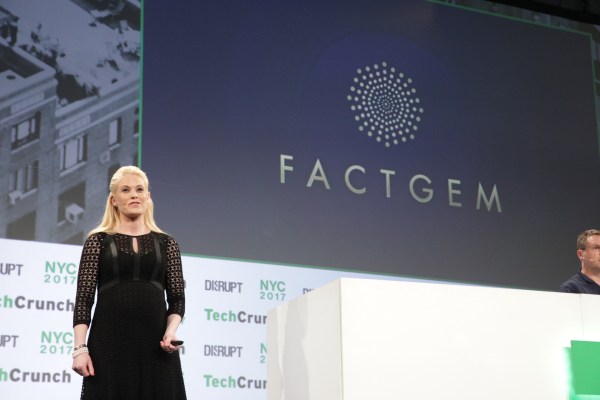FactGem, which is launching in our Disrupt New York Battlefield competition today, was born out of Megan Kvamme‘s frustration with trying to juggle hundreds of Excel spreadsheets — and the data in them — while she was working as an investment banker. When she tried to find a software product that would allow her to more easily analyze all of this data, she couldn’t find what she was looking for, so she started working on what would later become FactGem back in 2011.
“People said ‘no,’ that’s a hard problem. You can’t do that,” Kvamme recalled, and later added that what she wanted to build was essentially a Bloomberg terminal for data. Shortly after she started exploring the space, she met Clark Richey, now FactGem’s CTO, who has an extensive background in working with databases at MarkLogic and, as an intelligence contractor, worked with an array of three-letter agencies. “He was the first guy who was both smart enough and crazy enough to say, ‘hey, we deal with these problems in the intelligence world,’ ” Kvamme said.
[gallery ids="1490571,1490572,1490570"]
In its current iteration, FactGem is essentially an integration service that allows companies to bring their various data sources together to easily define new data models. It consists of three tools: WhiteboarderR, a drag-and-drop tool for describing the model (just like you would on a whiteboard); UploadR for matching this model with your data; and DashboardR for — you guessed it — building dashboards that also allow their users to easily dig deeper into the data.
The core idea here is to allow anybody in a company to work with these tools without ever having to write a single line of code.
While the project started out using MarkLogic’s database, the team later went on to use Neo4j as its underlying graph database. That’s where FactGem’s so called “data fabric” comes in. It ties together all the incoming data — which can arrive in real time. As Richey noted, the company worked hard to keep its stack platform agnostic. The team contends that using its system, businesses will be able to find more “gems” in their data — that is, business insights they otherwise may have missed.
Users can work with FactGem’s own dashboard tool or export their data to Tableau. Over time, the team also plans to add more advanced analytics features, including support for R (though once the data goes to Tableau, you could always use that’s service’s R support, too).
“We learned some important things along the way,” Kvamme told me about the company’s experience so far. “What it comes down to is that we solved this impossible problem from a tech perspective, but what we’re really providing is a business solution.”
FactGem is currently working with a number of clients, including in the retail and financial services space, though the team notes that it is also in the process of setting up a number of proof-of-concept projects for new clients.
The Columbus, Ohio-based company is currently self-funded (or funded through revenue, as Kvamme put it) and has a staff of about a dozen people. The team says that it is open to raising money, but that it would have to be the right investor.
